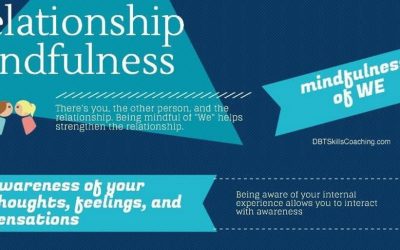Part of becoming mindful is the ability to know when you are in emotion mind, reasonable mind and wise mind. Emotion mind is particularly difficult. When you’re in emotion mind, it’s easy to snap at others, “I am not upset,” or “I am not wound up or over-reacting.” You see, when you’re in emotion mind, you’re closed to feedback from others and any problem-solving ideas.
Cedar Koons in her book on The Mindfulness Solution for Intense Emotions lists these steps for recognizing emotion mind:
1. Notice your body sensations. When you’re in emotion mind, you’ll feel intense body sensations, such as tight muscles, tense face, a churning in your gut, or a pounding in your chest.
2. Notice action urges. If you’re in emotion mind, you’ll have strong urges to do something RIGHT NOW or as soon as you can, such as tell someone exactly what you think, isolate, hide, or runaway.
3. Pay attention to your thoughts. Emotion mind narrows your attention so that you can only focus on what is relevant to that emotion. Your thoughts will only be about the emotion or the event that led to the emotion.
4. Pay attention to your body and facial expressions. Are you scowling? Are you hiding your face? Are your arms crossed in front of you?
Here is Koons’ checklist for identifying emotion mind:
___I am very focused on the emotion I feel.
___I can’t take my mind off what I want to do
___The outcome I am seeking feels very urgent
___My body is full of strong sensations (either pleasant or unpleasant)
___It is hard to consider alternative behavior
___I notice I am pushing aside my misgivings about acting on my emotion
___Some facts seem more relevant than others
___I am thinking of immediate rewards only
___My body temperature is up
If you checked one to three statements–go slow, emotion mind is engaged. Four to six, build in a pause before taking any action. Seven to ten, use STOP skill (stop/freeze, take a step back, observe, paced breathing)–emotion mind is fully in charge.
Everyone gets in emotion mind at times. Most everyone in emotion mind, says that they are not. This guide can be helpful. And remember, the goal is not to eliminate emotion mind because emotion mind makes needed contributions to our lives.
Live a skill-full life. By, Karyn Hall, Ph.D., May 28, 2020





0 Comments